|
Saturdee
Opry Links # 124:
Grab-bag
"The only difference between the melodrama of opera and the
melodrama of real life is. . .one has musical accompaniment!"---RR.
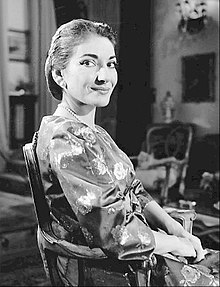
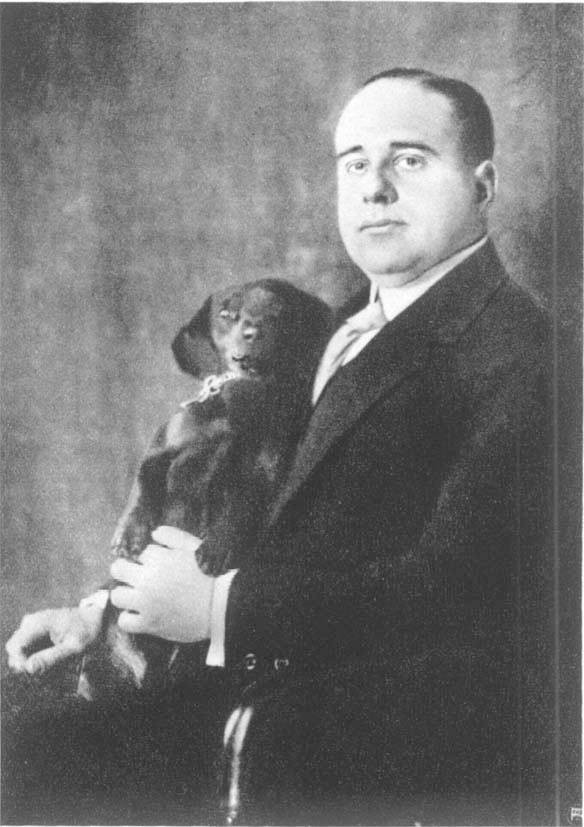
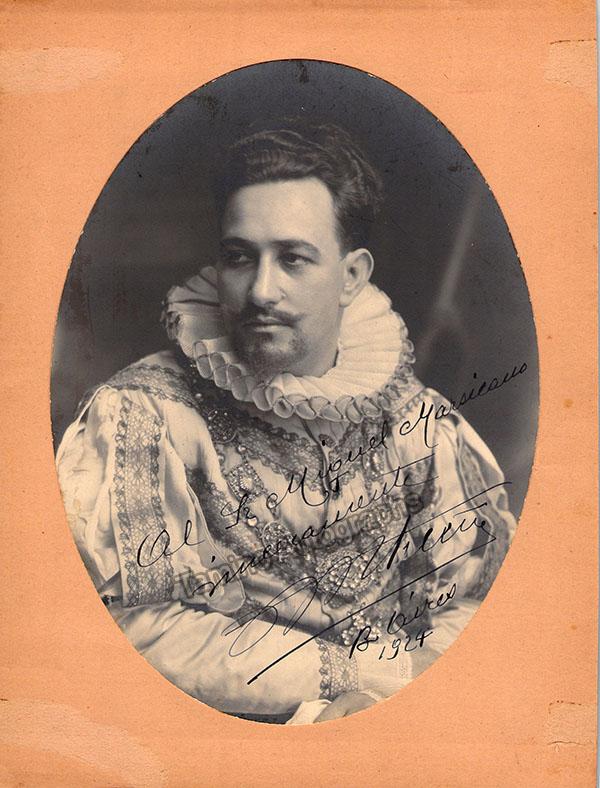
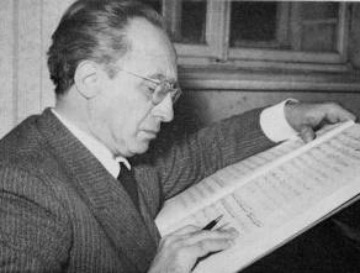
Maria Callas
Josef Mann and friend
Miguel Fleta
Lincinio Refice
Saturdee Opry Links Overture.
"Don Pasquale," by Donizetti.
https://www.youtube.com/watch?v=1RCSx1GRzr4
1.
Starting off with a flourish. . .Melodies you all know and love. . .From
"Carmen," Maria Callas waits through the brisk, infectious, classic overture
before intoning the Habanera, "L'amour est un oiseau rebelle" ("Love is a
rebellious bird.") Carmen comes off as a playful, dignified person in this
performance---as opposed to a slutty lunatic as too often portrayed today. Not
incidentally, Bizet did not write this melody, but adapted it from popular tune
of the time.
https://www.youtube.com/watch?v=EseMHr6VEM0
Setting: A square in Seville
Synopsis: After appearing out of the cigarette factory, Carmen seductively sings
about love and its unpredictable actions.
Translation:
http://www.aria-database.com/search.php?sid=2&X=30&individualAria=42
2.
Reaching again into the grab-bag edition of Saturdee Opry Links. . .Here is
Jacob Pincus Perelmuth, who was so lucky that his parents emigrated from Poland
to the U.S. in 1903. Perlmuth eventually figured on changing his name to
something a bit more commercial, Jan Peerce. Here is a great clip of him singing
the wonderful "O Paradiso," which this country certainly was for his family,
from "L'Africaine," (1865) by Meyerbeer. (You'll have to turn this up to hear it
well.) The opera is about fictitious events in the life of the real Vasco da
Gama (1460s – 1524) the Portuguese explorer. He was the first European to reach
India by sea.
https://www.youtube.com/watch?v=Mop4ADLW0EY
Synopsis:
It tells the story of the noble Inez and her love, Vasco da Gama. Her father
forces her to marry Don Pedro instead of Da Gama, who then goes before the court
and asks for permission to embark on an expedition to a new world. When he is
refused, there is a fight and he is imprisoned. Da Gama is rescued by one of his
slaves from the New World named Selika, who loves him. She brings him back to
her island, where he is captured for execution. It is after he is captured that
he looks out over the island and sings “O, Paradiso,” overcome with wonder at
the beauty of the New World.
Translation:
A Paradise
My heart throbs…wondrous scene !
At last I embrace you, land that I’ve dreamed of !
A paradise, emerging from the sea,
Flowering earth, brilliant sun,
I’m entranced by you !
You belong to me !
Oh new world,
I can offer you to my homeland !
This fertile earth is ours,
Which can enrich all Europe !
Wondrous scene !
You fascinate me !
Oh new world,
You belong to me !
To me!
Italian:
Mi batte il cor!
spettacol divin
sognata terra ecco ti premo al fin
o paradiso
dal onda uscito
fiorente suol
splendido suol
in voi rapito io son
tu m’appartieni
o nuovo mondo
alla mia patria ti posso
ti posso ofrir
nostro e questo terreno fecondo
que l’europa puo tutta arricchir
spettacolo divin
in te rapito
io son
O nuovo mondo
tu m’appartieni (rep)
a me, tu m’appartieni a me
o nuovo mondo tu m’appartieni
tu m’appartieni a me ame, ame, a me
3.
Enrico Caruso was struck by a falling pillar on the set of "Samson and Delilah"
at the Metropolitan Opera in 1920. It hit his right kidney, and seemed to
trigger a series of problems that culminated with his death. One Josef Mann was
hired a few months later to take Caruso's place at the Met. Mann, a successful
tenor in Europe, was finishing his obligations to the Berlin State Opera with a
production of "Aida," when he dropped dead of a heart attack at 38. Dangerous
places, these opera houses! Mann seems to have fallen just short of possessing
the "mighty high note," but in every other respect is compelling, commanding.
Here, in a rarity, he sings Manrico's love song, "Ah sì ben mio coll' essere,"
(sung in German as "Dass nur für mich dein Herz erbebt") from Act III of Verdi's
"Il Trovatore." This recording, made in Berlin for Odeon in the spring of 1921,
was one of his last. We are lucky to have it.
https://www.youtube.com/watch?v=4xxcAsYnc6c
Setting: A room adjoining the chapel at Castellor, 1409.
Synopsis: Although the castle of Castellor is under siege, Manrico and Leonora
are about to be married. Manrico tells his love that, even if the fortress is
destroyed and he is killed, he will die speaking her name.
Translation:
http://www.aria-database.com/search.php?individualAria=513
4.
Another reach into the grab-bag, and another slection with Maria Callas? Is this
grab-bag rigged? Again from her great 1962 concert in Hamburg, and again,
"Carmen." Madame Callas waits through the classic, enchanting incidental music
from the opera, then gifts us with the beguiling "Seguidilla." The which? A
seguidilla is an old Castilian folksong and dance form in quick triple time.
Bizet used the form, but this time wrote his own music (slower and more
complicated than a traditional seguidilla, if you're keeping score at home.) In
Act I, Carmen attempts to seduce her captor, the soldier Don José, in order to
be set free.
Setting: A square in Seville
Synopsis: After Carmen is arrested for fighting another girl in the cigarette
factory, Don Jose is assigned to watch her. She sings that she wants to go to
her friend Lillias Pastia's inn and insinuates that she would like him to go
with her.
https://www.youtube.com/watch?v=0zrDx-eZoUY
Translation:
http://www.aria-database.com/search.php?individualAria=43
5.
Lincinio Refice (1885-1954) was a priest and composer who taught at the Scuola
Pontifica for sacred music in Rome for 40 years. He died on stage while
conducting the morning rehearsal of his own opera, "Cecilia" (with soprano
Renata Tebaldi), inspired by the life of music's patron saint. (Dangerous
places, these opera houses!) The poignant words of "Ombra di Nube" are a prayer,
a plea, and a reminder that beauty remains, despite our suffering. Here is
Angela Gheorghiu.
https://www.youtube.com/watch?v=4HhiSGPDGx8
Text and Translation:
Era in ciel un arco azzurro di fulgor;
chiara luce si versava sul mio cuor.
Ombra di nube, non mi offuscare;
della vita non velarmi la beltà.
Vola, o nube, vola da me lontan;
sia disperso questo mio tormento arcan.
Ancora luce, ancora azzurro!
Il sereno io vegga per l’eternità!
The sky was an arc of dazzling blue;
A brilliant light shone down on my heart.
Shadow of a cloud, do not bring me darkness;
do not obscure the beauty of life for me.
Fly, cloud, fly far away from me;
Let this strange torment of mine be swept away.
Bring back the light, bring back the blue!
Let me see the clear sky for all eternity!
About Refice:
https://en.wikipedia.org/wiki/Licinio_Refice
6.
Tenor Alfredo Kraus was the son of an Austrian father and Spanish mother, raised
in the Canary Islands. Although he was great with conventional repertory---one
of the greats of his time, singing many times at the Met and La Scala---he cut
his teeth on the Spanish zarzuela (sort of lighter opera.) He remains one of the
great exponents of the form. Here he is with the zesty, delightful, "La Jota de
Dolores," from the Zarzuela, "La Dolores," by Tomas Breton.
https://youtu.be/9OoKo5PpheA
Translation:
https://lyricstranslate.com/en/la-jota-de-la-dolores-jota-la-dolores.html
7.
Now I know the grab-bag is rigged. Another Callas? Too bad we can't see her
here, but hearing her is really quite thrilling enough, isn't it? Yes, it's more
"Carmen," but who can get enough of "Carmen?" Not me. This is tour-de-force
stuff here, folks, as good as it gets. (Ladies, you are permitted to dance
around, if so moved, but be careful of the furniture.)
https://www.youtube.com/watch?v=uqn3n7256H0
Setting: The inn of Lillias Pastia
Synopsis: With her friends Frasquita and Mercedes, Carmen sings a wild gyspy
song about dancing and seduction to the joyous tavern crowd.
Translation:
http://www.aria-database.com/search.php?individualAria=1188
And here is how the scene can look. The soprano is wonderful Elīna Garanča (so
much tamer than Callas.)
https://www.youtube.com/watch?v=Q5h_7ywjPPQ
8.
Donizetti, of course, was the masterful exponent of bel canto (beautiful
singing) style opera, who really cranked 'em out. Good that he did, seeing as he
became one of the countless artists felled by syphilis (and, in his case,
complicated by manic-depression.) Here is the great, great forgotten Spanish
tenor, Miguel Fleta, an astonishing story on his own, with the gorgeous "Una
vergine, un angel di Dio," from "La Favorite." Once arguably the most acclaimed
tenor in the world, Fleta made a number of bad career decisions, capped off by a
bad political one (siding with the fascists in Spain, when Republicans failed to
support music education---you know, just like they do today!), and died at only
41 of renal failure. So as you have gleaned, the only difference between the
melodrama of opera and the melodrama of real life is. . .one has musical
accompaniment! Anyhow, here is the great Fleta with this lovely aria---notable
for its soft moments as well as heroic ones.
https://www.youtube.com/watch?v=I3Eu6vSSMj4
Synopsis : Fernand tells Balthasar, the Father Superior of the monastery, that
he would like to renounce his vows because he has fallen in love with a woman.
Although he doesn't know anything about her, he does know that she is young and
beautiful like an angel and that he cannot get her out of his thoughts.
Translation (partial):
A virgin, an angel of God
at the altar she prayed with me.
A hope, a terror, a desire
the impious came down to the soul and to joy.
Ah, my father, my father!
How beautiful she was! How beautiful she was!
Ah, my father, my father!
The peace of the heart has taken hold of me.
Ah. I turn my mind to the numb. . .
About Fleta:
http://www.operavivra.com/artists/tenors/miguel-fleta/
9.
When wear-and-tear (and women and song) took a toll on Fleta's operatic career,
he fell back on Zarzuela, of which he was a superb interpreter. Here he is with
the rousing, rather glorious "Te Quiero Morena," from José Serrano's zarzuela
"El Trust de los Tenorios."
https://www.youtube.com/watch?v=27ojZIO69pw
About Fleta:
https://en.wikipedia.org/wiki/Miguel_Fleta
Lyrics in Spanish:
https://lyricstranslate.com/en/rolando-villaz%C3%B3n-te-quiero-morena-lyrics.html
English translation (approximate):
"I love you, brunette,
I love you
As glory is wanted,
As money is wanted,
As a mother is loved,
i love you
I'm dying, baturra,
I'm dying
for your pink mouth
For your laugh, smooth one,
Through the eyes of your face,
I'm dying.
It's the jota
that I always sang
the salt of my land,
and smell! Olé!"
FINAL BOW:
I know what you're saying. "Aren't there any goddamned duets in opera? What's
your problem, Rip?" Well, I have many, many problems, rest assured, so that
answers that question. As for duets, here's a nice one. Greatest tenor and
soprano in the world today? Such questions are ridiculous, of course, but. . .Anja
Harteros and Jonas Kaufmann would be in the running. Here is the glorious duet,
"Ora soave, sublime ora d'amore," from "Andrea Chenier," by Umberto Giordano. I
think you can glean from the Italian what the gist of the aria is about, but
just in case, see translation below. (Kaufmann's first note here is astounding.)
https://www.youtube.com/watch?v=kvwYLK4BHWs
Synopsis:
Maddalena, dressed in a hooded cloak, enters hesitantly and asks if he is
Chénier. He replies yes as she reminds him of their first meeting. She tells him
she has always admired him from a distance. She says she is all alone,
frightened, and asks him to protect her. In an ardent duet, they declare their
love for each other and swear to remain together until death (Ora soave, sublime
ora d'amore!).
CHÉNIER:
When I am near you, calm overtakes my rebellious spirit.
You are the object of my every desire, of every dream, of every poem.
Within your glance I see the radiance of infinite expanses.
I look at you. In the green waves of your large eyes, I roam with my soul!
MADDALENA
I am here so that I may never leave you. This is not a farewell!
I have come to die with you! The suffering has ended.
I seek death, loving you!
Ah, the one who received the last words from my lips is he. . .Love!
Full duet translation:
http://www.carrerascaptures.de/lyrics/chenier02+07.html
Saturdee Opry Links Encore!
One good duet deserves another. Here, again, are Kaufmann and Harteros in
"Andrea Chenier," by Giordano. If this doesn't arouse goosebumps, you need
acupuncture. This is what great opera is all about. This is the duet, "Vicino a
te s'acqueta."
Synopsis:
Act 4
St. Lazare Prison
The subversive poet, Andrea Chénier, awaits his execution with Roucher, writing
verses of his faith in truth and beauty. Roucher leaves, as Mathieu sings the
Marseillaise outside. Maddalena enters with Gérard for a last meeting with
Chénier. Maddalena bribes the jailer Schmidt to let her change places with a
condemned noblewoman. Gérard leaves to make a last appeal to Robespierre. The
lovers sing about their love and their deliverance from this world after death.
As dawn approaches, Schmidt calls their names. They go to face the guillotine
joined in love. (Phew.)
https://www.youtube.com/watch?v=FOpWbdD0DoM
Translation:
https://www.opera-arias.com/giordano/andrea-chenier/vicino-a-te-s%27acquita/
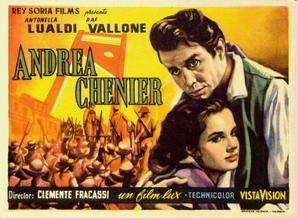
Back to Opera Links
Back to Home Page
|



